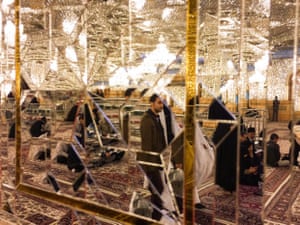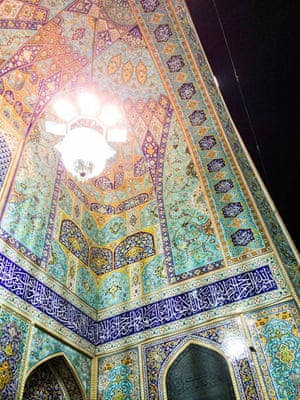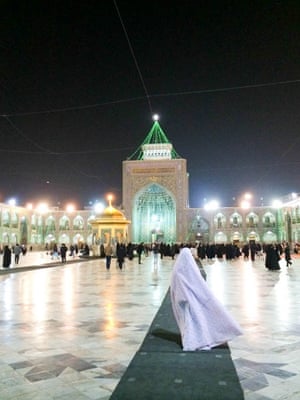Women selling sex in Iran in Mashhad many have seen the Iranian intelligence takes the women to reza grave to sell sex
Prayer, food, sex and water parks in Iran's holy city of Mashhad.
The Iranian shrine city of Mashhad has much to offer visiting Iraqis wanting to escape violence at home - but locals have mixed views about their guests.
The ticket agent at the gate in Mehrabad airport, Tehran, is irate. He’s shouting at a group of middle-aged Iraqi men, who are having trouble making sense of his flustered Farsi.
“Why didn’t you tie up your baggage before you got to baggage check?” he says with a heavy sigh. The men, some wearing unassuming pants and shirts and others sporting more traditional Arab dress, search for somewhere to set their baggage down and tie some string around it.
The Iraqi passengers on today’s flight to Mashhad number no more than 50, but that’s 30% of the cabin on this old Boeing. The plane has a narrow walkway down the middle of the six-seat rows, and finding one’s seat and a place to store carry-on items seems like a hassle for everyone. Cheerful, attractive flight attendants politely ask standing passengers to take their seats so others can pass.
But the attendants’ voices lose a little something when they address the Iraqi passengers. The Iranian businessman sitting next to me, a resident of Tehran, tells me he has no love for the Iraqis either.
“See how noisy they are?” he says. “Come on, this is a public place!”
As the plane slowly moves away from the gate towards the runway, the Iraqi passengers begin reciting prayers, and when the plane picks up speed and starts to lift off, it’s as though they want the sound of their prayers to overpower the roar of the engines.
Iranians might have engaged in such a ritual up until just a few years ago, but now it seems like the number of Iranians who observe pre-flight prayers lessens with each passing day.
Upon arrival in Mashhad, second most populous city and home to some of its most sacred sites, Iranian and Iraqi passengers alike are handed golden branches at the gate. After moving through the baggage claim, they reach an abundance of kiosks belonging to Mashhad’s various expensive and luxury hotels, where Iraqi passengers have a far warmer treatment than at Mehrabad. The young girls staffing the kiosks usually speak enough broken Arabic to hammer out a deal with the Iraqis, who speak their own broken Farsi.
Iraq has a Shia majority, and interest in visiting Iran’s Shia shrines – especially the tomb in Mashhad of the eighth Shia Imam, Imam Reza – rose after the United States ousted Saddam Hussein in 2003. Since the escalation of the Iraqi violence in 2011 and the appearance of Isis, the so-called Islamic state group, and its capture of a swathe of the country, the number of Iraqi Shia pilgrims to Iran has risen fast.
In January 2015, Mohammad Mehdi Baradaran, deputy of planning and development for the Mashhad mayor’s office, announced that 1.5 million foreign tourists visit Mashhad each year, with 23% from Iraq. “Many of the foreign visitors to Iran are pilgrims visiting the shrine of Imam Reza in Mashhad,” Baradaran told SMT News, an Iranian industry and business publication. “All of the other cities in Iran put together can’t boast Mashhad’s tourism figures.”
According to SMT’s estimates, every pilgrim visiting Mashhad spends roughly $1,500 (£990) in the city, meaning that the 345,000 who visit Mashhad every year spend $517m (£342m) altogether. However, government figures suggest that the number of Iraqi visitors to Mashhad could be much higher, as in 2014 Saeed Ohadi, president of the Hajj and Pilgrimage Association, a department in the Ministry of Culture and Islamic Guidance, said that 1.3 million Iraqi pilgrims visit Iran each year.
“I’m guessing that most of the Iraqi tourists to Iran do visit Mashhad,” a tourism expert in Mashhad tells Tehran Bureau. “The tourists are mostly Shias, who are fairly observant as far as I know, so they probably wouldn’t miss a trip to the shrine of Imam Reza.”
An official at Hashemi Nejad international airport in Mashhad believes that the number of Iraqis coming on a pilgrimage to the city has risen exponentially since the rise of Isis. “After Saddam fell in 2003, many Iraqis were coming to Iran each year, but then it kind of evened out after two or three years,” he said. “I estimate it hovered at around 100,000 a year for a while. But it’s risen sharply over the past year.”
A few taxi drivers camped out near the airport exit are keen to express their opinions. They too believe that both the number of Iraqi visitors and the time they spend in Mashhad have increased. “I know an Iraqi guy who has been renting a home in the Tabresi neighbourhood for six months,” says Mehdi, 25-year-old taxi driver.
However, taxi drivers working the airport beat in Mashhad are no fonder of visiting Iraqis than the flight attendants. “Somehow their dinar is worth way more than our rial,” says one driver. “They may behave like beggars, but the exchange rate means they can live like kings. When I visited Kerbala in Iraq, I paid the equivalent of about 800,000 rials (£19, $28) to get from the airport to the shrine, but here I only earn about 150,000 rials (£3.50, $5.25) for roughly the same trip. Iran is really cheap for them. But they still complain about even this measly fare, and they come with mostly large parties too. In fact they come like flocks of sheep. I have to stick to no more than four passengers in my car - five people in all including myself - and my car can’t accommodate any more than that. What happens if I get in an accident?”
Mehdi doesn’t have much hope that a surge of Iraqi visitors will do much for Mashhad’s economy, either. “They don’t even spend that much. They’re just here to escape the war. Little mice scampering into holes.”
Mehdi also comments on Iraqi men who come to Mashhad looking to patronize the city’s sizeable population of sex workers, many of which conduct business through a Shia system of ‘temporary marriage’ known in Iran as sigheh.
“They come looking for prostitutes. One day I picked up an Iraqi guy and he asked me if there were any sighehs around. I told him there were, did he want an Iraqi girl? Saudi? Bahraini? Lebanese? They’re here from all over the Arab world.” Mehdi releases a hearty laugh, but he is drawing on a historic animosity many Iranians harbour toward Arabs, and reflecting a sense in the more religiously observant sectors of Iranian society of a threat to the purity of Iranian women.
“We deserve all we get for letting those Arabs into our country,” Mehdi continues. “We have so little honour and pride left that even Arabs are showing up in this most holy city asking around for women. That bastard I just told you about? He actually knew some Farsi. So as soon as he asked about sighehs, I let loose every vile curse I ever heard, pulled over, grabbed him by his collar, and tossed him out of my cab. And as I drove off I yelled, ‘Eat shit!’ - just for good measure.”
Much to his disappointment, Mehdi’s stunt with the Iraqi passenger turned into more than just an amusing story.
“The asshole took down my plates,” he says. “He reported me to the taxi agency, and they called me in, confiscated my taxi for two months, and they made me pay a fine of 4m rials [£93, $140]. Just for standing up for our honour. It’s our right! And instead of thanking me for doing that, they fined me!”
Dozens of five-star hotels, luxury timeshares, and hostels line Imam Reza Street from Bargh Square all the way down to the Imam Reza shrine. Many of the managers of these establishments confirm that a common question from Iraqi visitors is where to find sex workers.
Iranian law expressly forbids an unmarried man and woman from entering a hotel room together, but people find ways. A young man, Alireza, is a kind of arranger for Iraqis looking to hire sex workers. Many hoteliers and shop-owners give Alireza’s number to inquiring Iraqis.
“It’s not just the Iraqis who are into it, man!” Alireza says. “Sex is a can’t-miss item on any good trip’s itinerary. The only thing is, because it’s illegal here, we have to get...creative.”
Alireza says he knows a few sex workers in Mashhad and that he’s happy to facilitate an encounter when Iraqis call upon him. But how does he secure a safe location?
“No problem,” he said. “The women have their own apartments around [middle- and working class districts of] Qasem Abad and Moallem Boulevard. The exchanges are made there.”
Alireza explains that the average price for a night with one of the women he works with is between two and three million rials [£46.50- £69.75, $70.50-$105.75]. “Some of the wealthier customers will hire a woman for the week. For instance, they might take a girl on a trip to Shiraz or something, or maybe up north to the Caspian Sea, Isfahan, places like that. For a week the girls charge between 20 and 30 million rials.”
Although Alireza refuses to set up a face-to-face interview with one of the women or even provide their numbers after I offer to pay him, he does agree to call someone and allow me to speak to her on his mobile. After a brief chat, he hands me the receiver, and I ask how she feels about her Iraqi customers and how they treat her.
“Iraqis are really good people, by and large. Some of them are very shy, but on the whole they’re generous and kind. A lot of them will even pay extra to stay in touch via Facebook or Viber after our time together is over.”
Still, sex isn’t all that’s on offer in Mashhad. Restaurants in the countryside about 20km outside of town, such as Shandiz and Torqabeh, attract a large Iraqi clientele. Shandiz features some of Iran’s most famous kebabs. The shishlik and barg kebabs in particular have a wide reputation that’s no secret to Iraqis.
Abd al-Hamid, a teacher from Najaf, Iraq, has brought his wife and two young daughters. “Everyone in Najaf knows about the food in Mashhad,” he said in heavily accented Farsi punctuated by laughs. “First Imam Reza, then shishlik – that’s the rule.”
Abd al-Hamid says that although he’s enjoyed his time in Mashhad, “I’ve witnessed a kind of disrespect that’s pretty pervasive. When Iranians come to Iraq, we love it and we respect and treat them very well. But I’ve felt really unwelcome by a lot of shop-keepers and taxi drivers here. I can’t say exactly why.”
A researcher from Tehran university says she knows why. “First off, you have to remember that we fought an eight-year war with each other, even though many of Iraq’s Shias opposed Saddam. But many Iranians don’t know that. Fortunately, most Iranians born since the 1980s [after the war] don’t have these feelings toward Iraqis. The other reason is this general anti-Arabism that persists in Iranian society and is part of why Iranians tend to think of themselves as culturally superior to Arabs. But I personally feel that since the emergence of Isis, many Iranians have made an effort to be more sympathetic to their Iraqi neighbours.”
Morteza, a 25-year-old seller of opal and turquoise stones on the second floor of the Reza Bazaar near the shrine, expresses fondness for Iraqi tourists. “These are really humble, kind, likeable people,” he says. “And they’re always suffering some hardship or another. They had to deal with the cruel dictator Saddam for 20 years, and he screwed up not only their lives, but our lives as well. And if that wasn’t bad enough, they had to put up with the Americans, who violated their women, and now they have those Isis brutes to deal with! Whenever I meet Iraqis, it’s always a friendly interaction. I even give them discounts, if you can believe it. I want to do whatever I can for them.”
Behrouz, a seller of traditional cashmere fabrics on the ground floor of the bazaar, differs. “There’s no one more annoying than those Iraqis!” he said. “They show up, make a lot of noise, bang everything about, and in the end they don’t even buy anything!”
Just as Behrouz’s screed begins to gather steam, an Iraqi customer enters the shop, causing him to break into a wide smile and politely greet the new customer with a few carefully practised words of accented Arabic.
At the Iraqi consulate, an employee offers further insight on the tensions between Iranians and Iraqis. “We rarely receive reports of violence against Iraqi nationals,” he says. “So this idea that there is real racism against Iraqis is not true. Of course we do get complaints - poor treatment by taxi drivers and such - but as far as I know even native Mashhadis aren’t on the best of terms with their taxi drivers. On the whole, Iraqis are satisfied with their visits to Mashhad, and they like the idea of coming back.”
Another can’t-miss for Iraqi tourists in Mashhad is one of the city’s water parks. A ticket seller at Water Waves Land on Andisheh Qasem Boulevard ponders the water parks’ popularity. “Probably 20% of our visitors are Iraqis. They love Mashhad’s water parks, and when they come, they stay for the whole day. It’s like they never get tired of it.”
Mashhad has the highest concentration of water parks in Iran, and they are generally crowded. It’s easy to find Arabic speakers in the masses of people.
Ayad, a 44-year-old electrical appliance seller from Kerbala who speaks a little English, has been in Mashhad for four days. “I never miss coming to this water park when I visit Mashhad,” he said. “It’s so full of energy, even if it’s a little crowded. I’ve been here eight hours but I’ve only been riding slides and stuff for about an hour altogether. But that’s fine by me. Mashhad is a joyful and exciting city. And I mean ‘exciting’ in a good sense, not the kind of excitement we get in Iraq, where bullets and blood are never far away.”
Ayad, a 44-year-old electrical appliance seller from Kerbala who speaks a little English, has been in Mashhad for four days. “I never miss coming to this water park when I visit Mashhad,” he said. “It’s so full of energy, even if it’s a little crowded. I’ve been here eight hours but I’ve only been riding slides and stuff for about an hour altogether. But that’s fine by me. Mashhad is a joyful and exciting city. And I mean ‘exciting’ in a good sense, not the kind of excitement we get in Iraq, where bullets and blood are never far away.”
Since you’re here …
… we’ve got a small favour to ask. More people are reading the Guardian than ever, but far fewer are paying for it. Advertising revenues across the media are falling fast. And unlike some other news organisations, we haven’t put up a paywall – we want to keep our journalism open to all. So you can see why we need to ask for your help. The Guardian’s independent, investigative journalism takes a lot of time, money and hard work to produce. But we do it because we believe our perspective matters – because it might well be your perspective, too.
If everyone who reads our reporting, who likes it, helps to support it, our future would be much more secure.
https://www.theguardian.com/world/iran-blog/2015/may/07/prayer-food-sex-and-water-parks-in-irans-holy-city-of-mashhad
























.jpg)




























































.jpg)

Inga kommentarer:
Skicka en kommentar